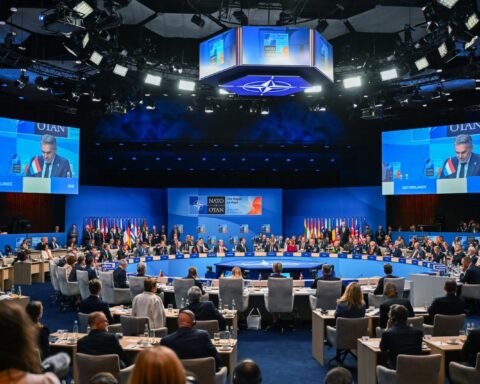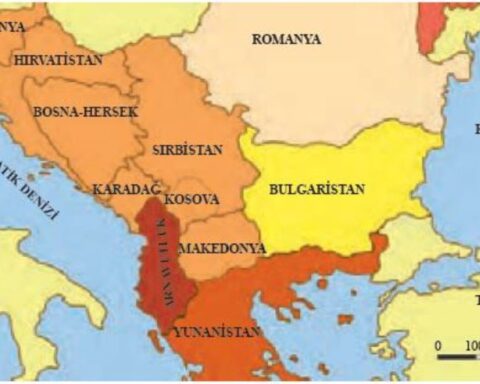Greece is rapidly transforming into Israel’s most loyal and unexpected friend.
While much of the international community has recoiled from Israel’s military operations in Gaza, Greece has gone in the opposite direction. Once known for its historic solidarity with the Palestinian cause, Athens has emerged as one of Israel’s most vocal and dependable allies in Europe—diplomatically, militarily, and rhetorically.
This shift is not driven by ideology alone. Greece’s unwavering support for Israel reflects deeper geopolitical ambitions: cementing its strategic position in the Eastern Mediterranean, counterbalancing Türkiye, and securing access to energy and defense partnerships. But this alignment may come at a diplomatic cost that undermines Greece’s long-held credibility on international law.
Greek Prime Minister Kyriakos Mitsotakis made his position clear just two weeks after the October 7 Hamas attacks, when he became the first world leader to visit Israel. “I come here not just as an ally, but as a true friend,” he said in Jerusalem. Since then, Greece has set itself apart from other European democracies that have condemned or distanced themselves from Israel’s actions in Gaza and the West Bank.
Over the past two years, Israel has faced global scrutiny for its conduct, including charges of war crimes, an expanding occupation in the West Bank, and a genocide investigation by the International Criminal Court (ICC). Yet Greece has provided steady support, both diplomatically and militarily.
In July 2024, Israeli jets bombed targets in Yemen—the furthest strike ever carried out from Israeli territory. Weeks earlier, according to Israeli media outlets, some of the aircraft involved had taken part in joint drills at Greece’s Souda Bay base in Crete, simulating long-range missions. Greece’s involvement was not direct, but its cooperation in these exercises sent a clear message of strategic alignment.
Greece has played a mitigating role in the EU’s response to Israel, often diluting or resisting stronger collective action. In May 2025, the EU’s Foreign Affairs Council considered reviewing (and potentially suspending) its extensive trade and cooperation agreement with Israel in response to deteriorating humanitarian conditions in Gaza. A Dutch proposal garnered support from 17 of the EU’s 27 foreign ministers—but Greece was among the few countries (including Cyprus, Germany, Hungary, Italy, Czechia, Croatia, Lithuania, and Bulgaria) that did not back the move.
Two months later, the Council met again to discuss a list of 10 proposed measures aimed at pressuring Israel to improve the humanitarian situation in Gaza. The bloc’s 27 foreign ministers only agreed to “keep a close watch” on Israel’s compliance with a recent agreement to improve humanitarian aid access. “The aim is not to punish Israel; the aim is to improve the situation in Gaza,” said Kaja Kallas, the EU’s top diplomat, in a statement.
No minutes or voting records from the session were disclosed by the EU, leaving Greece’s exact position unclear. Nevertheless, political analysts in Athens—based on previous diplomatic activity—appear confident that Greece did not support any of the proposed measures to pressure Israel.
Later, Greece also declined to join 22 other states in condemning the famine conditions in the Strip. In July 2025, it did not sign a joint statement of 26 Western countries demanding UN humanitarian assistance to reach Palestinians in Gaza. Greece and Cyprus eventually signed the statement 24 hours later.
In June 2025, as tensions flared between Israel and Iran, Netanyahu’s official aircraft—the “Wing of Zion”—landed in Athens. The government insisted it was only transporting the Israeli ambassador, yet speculation about the plane’s true purpose ran rampant.
More strikingly, Greece has refused to clarify whether it would enforce the ICC arrest warrant for Netanyahu if he set foot on Greek soil. Spokesman Pavlos Marinakis said that the ICC warrant is “a decision that will solve no problem,” downplaying its relevance. Notably, Netanyahu’s trips to Europe and the United States have involved travel through Greek airspace, reportedly bypassing countries more inclined to enforce the warrant.
Athens’ support for Israel also reflects shared energy ambitions. In March 2025, Greece’s Minister of Environment and Energy, Stavros Papastavrou, praised “common goals for development and stability” during a meeting with his Israeli counterpart. The centerpiece of this cooperation is the long-discussed Great Sea Interconnector project, a submarine electricity cable linking Israel, Cyprus, and Greece. Although the project has stalled since its 2017 proposal, the Greek government remains eager to revive it as a strategic tool to limit Türkiye’s regional influence.
The economic relationship is growing in other ways, too. Israeli investment in Greek real estate and tourism has continued to rise. Nearly one million Israeli tourists were expected to visit Greece in 2025, although hostilities with Iran disrupted travel plans for many.
Domestically, Greece’s pro-Israel stance has become part of the ruling party’s political narrative. After a pro-Palestinian protest in Athens in July 2025, Health Minister Adonis Georgiadis—also the conservative party’s vice president—tweeted that demonstrators were “anti-Semites and enemies of the most loyal and valuable ally of Greece: Israel!” He added, “We are with Israel, whether they like it or not.” Escalating tensions further, during the same period, Justice Minister George Florides effectively accused the opposition of treason during a parliamentary session, exclaiming: “The governing conservative MPs support the strategic alliance with Israel, while you (the opposition) are trying to undermine it in favor of Türkiye. In favor of Türkiye!”
Shifting Alliances
This pivot is dramatic, but not entirely sudden. Greece only officially recognized the state of Israel in 1990, making it the last European country to do so—under Prime Minister Konstantinos Mitsotakis, the current premier’s father. Still, for decades, Greece maintained a relatively balanced approach to the Israeli-Palestinian conflict.
The change began to accelerate in 2010, when Netanyahu made the first-ever visit by an Israeli prime minister to Greece. His host was Prime Minister George Papandreou, the son of former Prime Minister Andreas Papandreou, who in the 1980s was a close ally of the PLO and Yasser Arafat. But by 2010, with Israel’s relations with Türkiye deteriorating, Athens seized the opportunity to strengthen its position as a regional partner.
Even the left-wing SYRIZA government continued the rapprochement. In 2015, Prime Minister Alexis Tsipras referred to Jerusalem as Israel’s “historic capital,” well before the United States relocated its embassy there. His defense minister, Panos Kammenos, singed a Status of Forces Agreement with his Israeli counterpart, enabling Israel to station its military forces in Greek territory and vice versa. Greece was the first country to sign such an agreement with Israel after the United States. Cyprus followed.
The Cost of Unwavering Support
Despite this realignment, Greece continues to base its territorial claims against Türkiye on a strict interpretation of international law. That makes its enthusiastic support for Israel—a country widely ac
cused of violating international law in Gaza and the West Bank—deeply problematic.
If Greece and Türkiye were to eventually refer their disputes to the International Court of Justice, Athens may find its moral authority undercut. The inconsistency could weaken its legal case and embolden critics who argue Greece selectively applies international norms when it suits its foreign policy goals.
At a time when global institutions are under strain and international law is being tested, Greece’s decision to stand with Israel—no matter the cost—signals a new phase in Eastern Mediterranean geopolitics. But that choice may ultimately come with a diplomatic price.
* Tony Rigopoulos is a journalist and political analyst based in Athens, Greece, with an academic background in international relations. He has served as editor-in-chief at local media outlets and has collaborated with international media, including Times Radio and the Associated Press. He is currently the political editor at Newsbomb.gr.
Source: https://fpif.org/greeces-risky-embrace-of-israel/






